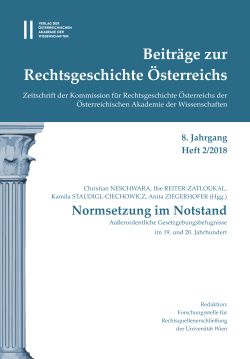
Beiträge zur Rechtsgeschichte Österreichs 2 / 2018, pp. 452-461, 2018/11/28
Normsetzung im Notstand
Außerordentliche Gesetzgebungsbefugnisse im 19. und 20. Jahrhundert
At least since 1930, the executive branch of Brazilian government has issued a series of “decrees with force of law“, ordinary decrees, decree-laws, and so-called “provisional measures”, thus becoming a very important actorsometimes the leading one- in the field of law making. One could discuss how far this fact reflects a broadly understood “state of exception“, a supposed authoritarian trend of Brazilian society, the increase of presidential power at the expense of Parliament, or the “normal development“ of all western interventionist states. Nevertheless, the fast and substantial increase of State intervention in the 1930’s in many social and economic spheres certainly led to conflicts between legal thought and the new practices of “active government“. As seen in the case of the new “Mining Code“, the resulting tensions could not be completely eliminated by political strategies such as the exclusion of decrees from judicial control, the selective use of constitutional texts or the subtle subversion of the hierarchical structure of the liberal legal system.
Keywords: Constitution of 1934 – Decree – Mining Code – State intervention – Vargas